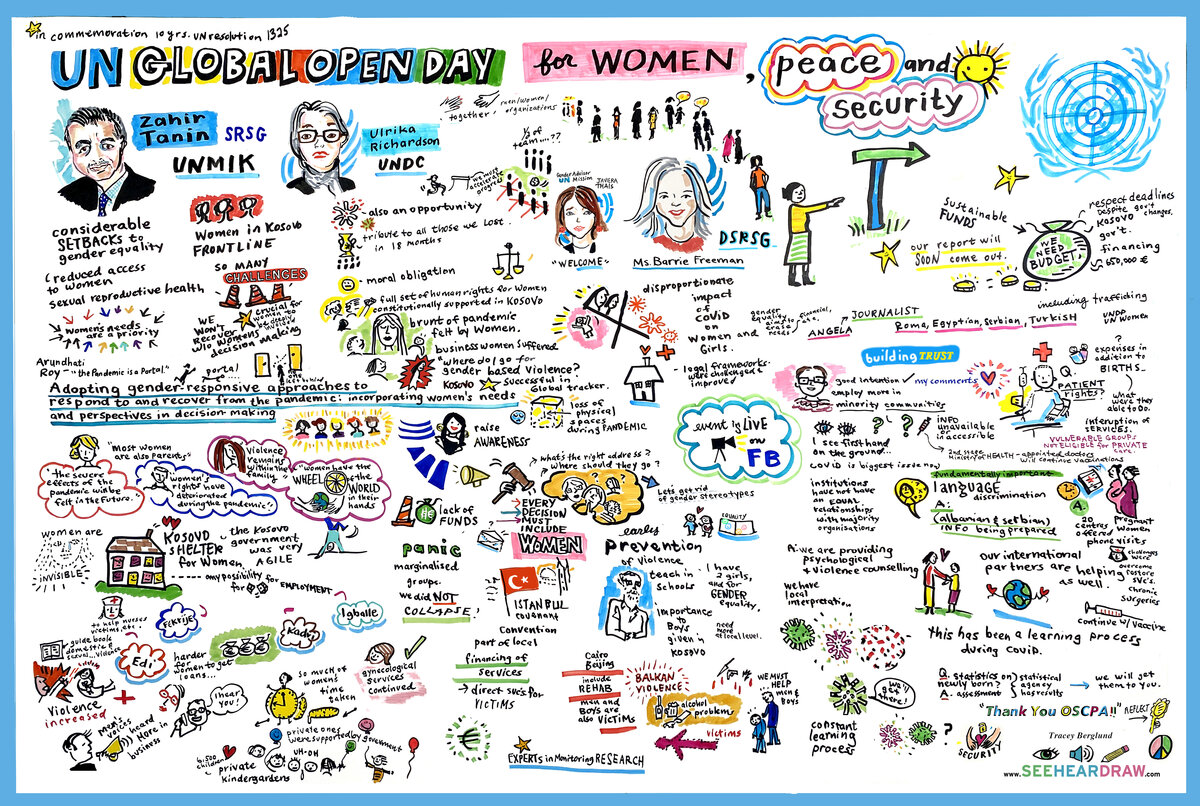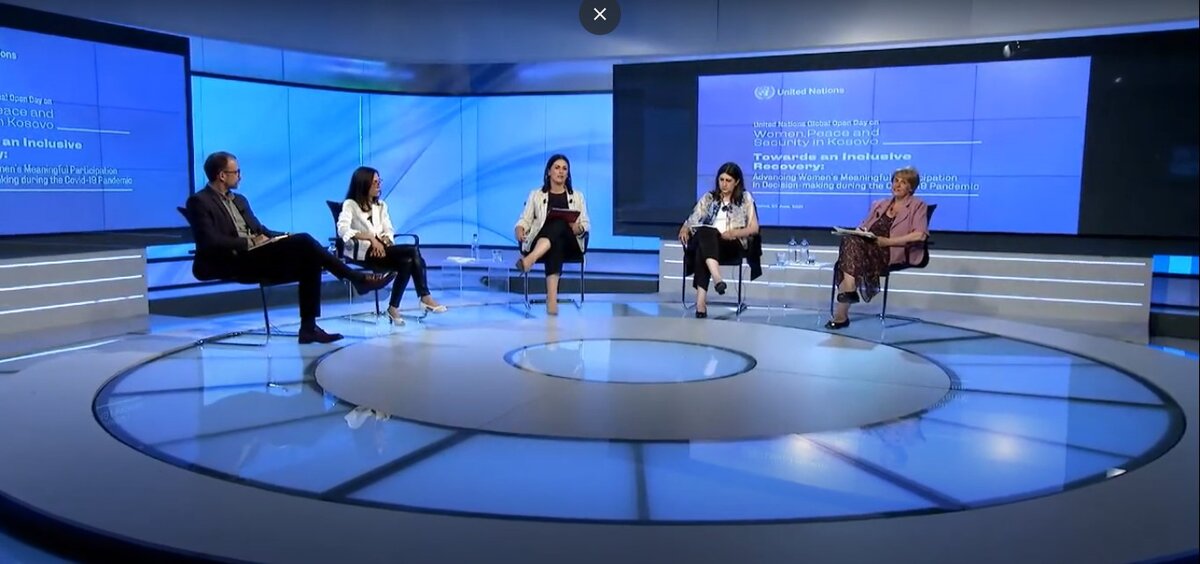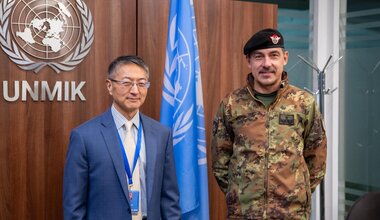Towards an inclusive recovery: United Nations Global Open Day in Kosovo calls to advance women’s meaningful decision-making to combat COVID-19 impact
Sharing their experiences from different realms of civil society and government, on 23 June, the United Nations family in Kosovo hosted Global Open Day on Women, Peace and Security in Kosovo to highlight the importance of women’s meaningful participation in the development of policies to address and recover from the pandemic.
Panelists discussed the variety of impacts shouldered by women in Kosovo during the pandemic, from the economic sphere, to health and psychosocial consequences, and how these pandemic-related repercussions have reaffirmed the need for women to be better integrated into decision-making roles. Over 100 people tuned in on Zoom to watch the event.
Special Representative of the Secretary-General and Head of UNMIK, Mr. Zahir Tanin highlighted the gendered impact of the pandemic, and its long-lasting consequences in his keynote speech. “Women have been the most affected. The pandemic has progressively intensified pre-existing interconnected systemic and existential risks, resulting in considerable setbacks to our joint pursuit for gender equality and the empowerment of women,” SRSG Tanin stated.
Going forward, SRSG Tanin added, “The UN family in Kosovo has placed women's needs and priorities at the centre of our efforts to support the COVID‑19 response and recovery. We consider this a priority, not only because it is a moral imperative, but because we will not be able to recover if we don’t tap into women’s talents and potential in equal measure with those of men.”

Ms. Ulrika Richardson, UN Development Coordinator for Kosovo, noted that Kosovo’s pandemic response included measures to increase economic security for women, including supporting preschool education and women-owned businesses. Ms. Richardson noted that “Decision-makers in Kosovo – women and men – have been conscious of the need for gender-sensitive responses. The need to involve more women in these decision-making processes, however, remains unabated.”
Ms. Barrie Freeman, Deputy Representative of the Secretary-General, asserted that including women in decision-making was not only the “right thing” and “the just thing” but “also the SMART thing to do,” adding that “integrating the needs and priorities of women from all communities, majority and non-majority, will help drive a better recovery and ensure that Kosovo emerges from this crisis more united as a society.”
Different sectors, same priority: integrating women’s voices
As Dr. Zana Kaçaniku-Deva, a lead Microbiologist at the National Institute of Public Health of Kosovo, stated in an introductory video interviewing people from across Kosovo about women’s roles in decision-making, “The process of planning and policy-making without investing in gender mainstreaming cannot be done, it is non-negotiable and should be seen as a priority.”
Ms. Vlora Nushi, Head of UN Women Office in Kosovo who moderated a panel discussion with representatives from Kosovo government and civil society, said the panelists’ points indicated the urgent need to better integrate women into Kosovo’s decision-making frameworks.
Mr. Kadri Gashi of the Centre for Counselling, Social Services and Research noted during the panel that one of those lessons must be the inclusion of men and boys in the fight for gender equality, by breaking down barriers that prevent men from accessing psychosocial counselling services, and by expanding those services for all.

Several of the panelists affirmed Mr. Gashi’s thoughts on strengthening and expanding the healthcare system to make it more gender-equitable. Speaking about the different health consequences she witnessed as Chief Nursing Officer, Ms. Fekrije Hasani shared how gender-based and sexual violence had risen in Kosovo, while pregnant women also experienced severe cases of COVID-19.
Journalist and Gračanica Online editor Andjelka Cup noted that the gendered impact of inadequate translation services in Kosovo, particularly for women from non-majority communities, was exacerbated during the pandemic. “Simply, the lack of information in the mother tongue produces major problems and thus prevents the integration of minority or non-majority communities into Kosovo society.”
Providing perspectives from the political sphere, Ms. Adelina Berisha of the Kosovo Women’s Network noted that women’s advocacy groups in Kosovo had always been strong but faced difficulties during the pandemic.
As Ms. Edi Gusia, Head of the Kosovo Agency for Gender Equality noted “If the pandemic has taught us anything, it is that human civilization is very vulnerable, it is very fragile and it can be harmed in numerous ways. If we need to have some lessons learned from this pandemic, what to do, what were the mistakes that were made for us to have a global strategy in place to react to such risks in order to save the lives of people, of men and women, boys and girls. This should be a learning process, a constant learning process for all of us.”
To learn more about the panelists’ insights, watch the recording in English here, in Serbian here, or in Albanian here.
What is UN Global Open Day?
Launched in October 2010 in commemoration of the tenth anniversary of Security Council Resolution 1325 on Women, Peace and Security, Global Open Days events are designed to support regular dialogue between UN senior leadership and women’s organizations around the world.
Global Open Day consultations provide a platform where women’s voices can be heard and offer an opportunity to review the implementation of Resolution 1325. Today, Global Open Days are organized worldwide and inform the UN Secretary-General’s annual report on Women, Peace and Security.
 UN
UN United Nations Peacekeeping
United Nations Peacekeeping





